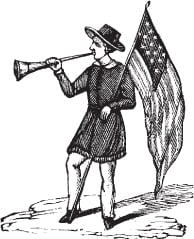
– VOICES OF FREEDOM –
From William Lyman and Others, Letter to the Middletown Sentinel and Witness (1850)
The passage of the Fugitive Slave Act in 1850 raised in the most direct way the relationship between law and liberty. Six residents of Middletown, Connecticut, in a letter to the local newspaper, explained why they would not obey the new law.
The undersigned are friends of law. We reverence law. We are of the party of law and order . . . Even an imperfect law we will respect and bear with, till we can obtain its modification or repeal. But all is not law which calls itself law. When iniquity frames itself into law, the sacredness of law is gone. When an enactment, falsely calling itself law, is imposed upon us, which disgraces our country, which invades our conscience, which dishonors our religion, which is an outrage upon our sense of justice, we take our stand against the imposition.
The Fugitive Slave Law commands all good citizens to be slave catchers. Good citizens cannot be slave catchers, any more than light can be darkness. You tell us, the Union will be endangered if we oppose this law. We reply, that greater things than the Union will be endangered, if we submit to it: Conscience, Humanity, Self-respect are greater than the Union . . . . When our sense of decency is clean gone forever, we will turn slave catchers; till then, never. You tell us that great men made this law. If great men choose to disgrace themselves, choose to put off all manliness, and plunge all over into meanness and dishonor, it does not follow that small men should do so too. If Beacon Street [a chief commercial street in Boston] and Marshfield [Daniel Webster’s estate] choose to turn slave catchers, let them. We farmers and working men choose to stay by our plows and mills . . . . We are not yet ready to give ourselves over to all manner of villainy. Be the consequence what it may, come fines, come imprisonment, come what will, this thing you call law we will not obey.
From Declaration of the Immediate Causes of Secession (1860)
In December 1860, South Carolina declared its secession from the Union. Like the American Revolutionaries of 1776, the legislature issued a document explaining to the world why the state had taken this step.
The non-slaveholding States . . . have assumed the right of deciding upon the propriety of our domestic institutions; and have denied the rights of property established in fifteen of the States and recognized by the Constitution; they have denounced as sinful the institution of slavery; they have permitted open establishment among them of societies, whose avowed object is to disturb the peace and to eloign [take away] the property of the citizens of other States. They have encouraged and assisted thousands of our slaves to leave their homes; and those who remain, have been incited by emissaries, books and pictures to servile insurrection.
For twenty-five years this agitation has been steadily increasing, until it has now secured to its aid the power of the common Government . . . . A geographical line has been drawn across the Union, and all the States north of that line have united in the election of a man to the high office of President of the United States, whose opinions and purposes are hostile to slavery. He is to be entrusted with the administration of the common Government, because he has declared that that “government cannot endure permanently half slave, half free,” and that the public mind must rest in the belief that slavery is in the course of ultimate extinction. . . .
On the 4th of March next this party will take possession of the Government. It has announced that the South shall be excluded from the common territory, that the Judicial tribunal shall be made sectional, and that a war must be waged against slavery until it shall cease throughout the United States.
The guarantees of the Constitution will then no longer exist; the equal rights of the states will be lost. The slaveholding states will no longer have the power of self-government, or self-protection, and the federal government will have become their enemy.
| Questions |
|---|
| 1. Whom do the Connecticut writers seem to blame for the Fugitive Slave Act? 2. What is the main motivation for South Carolina’s secession? 3. What do these documents indicate about the rule of law in the nineteenth-century United States? |